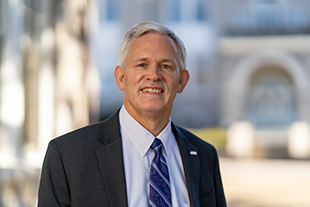 Jonathan Alger became the 6th president of James Madison University on July 1, 2012. Under his leadership, the university developed a bold new vision to be "the national model of the engaged university: engaged with ideas and the world," and a strategic plan focused on engaged learning, community engagement and civic engagement. The plan included the development of ambitious new programs and initiatives across the institution, such as the Valley Scholars Program (for first-generation students from public schools in the region), the James Madison Center for Civic Engagement (which provides national as well as institutional leadership), the Economic Development Council (to support regional economic growth), the Madison Trust (to provide philanthropic support for innovative projects), the Engagement Fellows (a public service year program for recent college graduates), the comprehensive Task Force on Racial Equity and a strategic partnership with the Republic of Kosovo among many others.
Jonathan Alger became the 6th president of James Madison University on July 1, 2012. Under his leadership, the university developed a bold new vision to be "the national model of the engaged university: engaged with ideas and the world," and a strategic plan focused on engaged learning, community engagement and civic engagement. The plan included the development of ambitious new programs and initiatives across the institution, such as the Valley Scholars Program (for first-generation students from public schools in the region), the James Madison Center for Civic Engagement (which provides national as well as institutional leadership), the Economic Development Council (to support regional economic growth), the Madison Trust (to provide philanthropic support for innovative projects), the Engagement Fellows (a public service year program for recent college graduates), the comprehensive Task Force on Racial Equity and a strategic partnership with the Republic of Kosovo among many others.
JMU evolved significantly under President Alger's leadership, developing new undergraduate and graduate programs as well as many significant new and renovated buildings (e.g., for the life sciences, health and behavioral studies, business, history, residence life, dining, and athletics). In 2022, JMU was reclassified as an R2 national research university under the Carnegie Classifications. Its endowment more than doubled, and the institution surpassed its stretch goal to raise over $251 million in the comprehensive Unleashed campaign to support the university's vision. The university received the highest level of autonomy under state law based on its bond rating and overall management, and also was recognized with the Carnegie Classification for Community Engagement. In 2022, JMU transitioned to the Sun Belt Conference and the highest level of Division I Football.
Career Highlights and Achievements
Prior to coming to JMU, Alger served as senior vice president and general counsel at Rutgers University, where he provided strategic leadership on a variety of issues and established a comprehensive compliance program. He had previously worked as assistant general counsel at the University of Michigan, where he played a key leadership role in the university's efforts in two landmark Supreme Court cases on diversity and admissions and coordinated one of the largest amicus brief coalitions in Supreme Court history. Earlier in his career he worked in the national office of the American Association of University Professors on issues such as academic freedom, shared governance, tenure and due process. He also served for several years in the headquarters of the U.S. Department of Education's Office for Civil Rights, where he was the point person on the development and implementation of national policies on race-conscious financial aid, racial harassment and free expression. He began his career as an associate in the Labor and Employment Section of the international law firm of Morgan, Lewis and Bockius.
Boards, Memberships and Service
President Alger has been recognized as a leader by his peers nationally in many contexts. He served on the following:
- National board of directors for the American Association of Colleges and Universities (AAC&U);
- Chair of the Association of Governing Boards' Council of Presidents;
- NCAA's Division I Infractions Appeals Committee;
- Knight Commission on Intercollegiate Athletics;
- Member of the Council on Competitiveness, the Council on Foreign Relations, and the national leadership council for More Perfect (focused on the health of democracy);
- Board member of the Northern Virginia Technology Council, the Virginia Business Higher Education Council and the Region 8 Virginia Growth and Opportunity Regional Council; and,
- Served as past chair of the Board of Directors of the National Association of College and University Attorneys, which has honored him with Life Membership and the Distinguished Service Award.
Personal History
Alger was born and raised outside Rochester, N.Y. He earned his B.A. with High Honors and Phi Beta Kappa from Swarthmore College (political science major, history minor and public policy concentration), and his J.D. with Honors from Harvard Law School.
